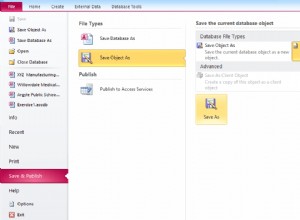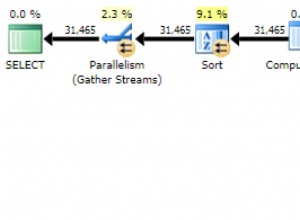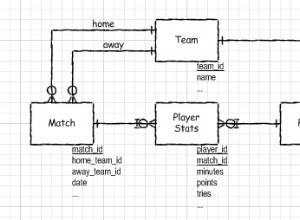Pour des intervalles de 15 minutes :
with i as (
select cf.tagindex, min(dateandtime) dateandtime
from contfloattable cf
group by
floor(extract(epoch from dateandtime) / 60 / 15),
cf.tagindex
)
select cf.dateandtime, cf."Val", cf.status, t.tagname
from
contfloattable cf
inner join
conttagtable t on cf.tagindex = t.tagindex
inner join
i on i.tagindex = cf.tagindex and i.dateandtime = cf.dateandtime
order by cf.dateandtime, t.tagname
Affichez la sortie d'explication pour cette requête (si cela fonctionne) afin que nous puissions essayer d'optimiser. Vous pouvez le publier dans cette réponse.
Expliquer la sortie
"Sort (cost=15102462177.06..15263487805.24 rows=64410251271 width=57)"
" Sort Key: cf.dateandtime, t.tagname"
" CTE i"
" -> HashAggregate (cost=49093252.56..49481978.32 rows=19436288 width=12)"
" -> Seq Scan on contfloattable cf (cost=0.00..38528881.68 rows=1408582784 width=12)"
" -> Hash Join (cost=270117658.06..1067549320.69 rows=64410251271 width=57)"
" Hash Cond: (cf.tagindex = t.tagindex)"
" -> Merge Join (cost=270117116.39..298434544.23 rows=1408582784 width=25)"
" Merge Cond: ((i.tagindex = cf.tagindex) AND (i.dateandtime = cf.dateandtime))"
" -> Sort (cost=2741707.02..2790297.74 rows=19436288 width=12)"
" Sort Key: i.tagindex, i.dateandtime"
" -> CTE Scan on i (cost=0.00..388725.76 rows=19436288 width=12)"
" -> Materialize (cost=267375409.37..274418323.29 rows=1408582784 width=21)"
" -> Sort (cost=267375409.37..270896866.33 rows=1408582784 width=21)"
" Sort Key: cf.tagindex, cf.dateandtime"
" -> Seq Scan on contfloattable cf (cost=0.00..24443053.84 rows=1408582784 width=21)"
" -> Hash (cost=335.74..335.74 rows=16474 width=44)"
" -> Seq Scan on conttagtable t (cost=0.00..335.74 rows=16474 width=44)"
Il semble que vous ayez besoin de cet index :
create index cf_tag_datetime on contfloattable (tagindex, dateandtime)
Exécutez analyze après l'avoir créé. Notez maintenant que tout index sur une grande table aura un impact significatif sur les performances des modifications de données (insertion, etc.) car il devra être mis à jour à chaque modification.
Mettre à jour
J'ai ajouté l'index cf_tag_datetime (tagindex,dateandtime) et voici la nouvelle explication :
"Sort (cost=15349296514.90..15512953953.25 rows=65462975340 width=57)"
" Sort Key: cf.dateandtime, t.tagname"
" CTE i"
" -> HashAggregate (cost=49093252.56..49490287.76 rows=19851760 width=12)"
" -> Seq Scan on contfloattable cf (cost=0.00..38528881.68 rows=1408582784 width=12)"
" -> Hash Join (cost=270179293.86..1078141313.22 rows=65462975340 width=57)"
" Hash Cond: (cf.tagindex = t.tagindex)"
" -> Merge Join (cost=270178752.20..298499296.08 rows=1408582784 width=25)"
" Merge Cond: ((i.tagindex = cf.tagindex) AND (i.dateandtime = cf.dateandtime))"
" -> Sort (cost=2803342.82..2852972.22 rows=19851760 width=12)"
" Sort Key: i.tagindex, i.dateandtime"
" -> CTE Scan on i (cost=0.00..397035.20 rows=19851760 width=12)"
" -> Materialize (cost=267375409.37..274418323.29 rows=1408582784 width=21)"
" -> Sort (cost=267375409.37..270896866.33 rows=1408582784 width=21)"
" Sort Key: cf.tagindex, cf.dateandtime"
" -> Seq Scan on contfloattable cf (cost=0.00..24443053.84 rows=1408582784 width=21)"
" -> Hash (cost=335.74..335.74 rows=16474 width=44)"
" -> Seq Scan on conttagtable t (cost=0.00..335.74 rows=16474 width=44)"
Il semble avoir augmenté dans le temps :( Cependant, si je supprime la commande par clause (pas exactement ce dont j'ai besoin, mais cela fonctionnerait), voici ce qui se passe, grosse réduction :
"Hash Join (cost=319669581.62..1127631600.98 rows=65462975340 width=57)"
" Hash Cond: (cf.tagindex = t.tagindex)"
" CTE i"
" -> HashAggregate (cost=49093252.56..49490287.76 rows=19851760 width=12)"
" -> Seq Scan on contfloattable cf (cost=0.00..38528881.68 rows=1408582784 width=12)"
" -> Merge Join (cost=270178752.20..298499296.08 rows=1408582784 width=25)"
" Merge Cond: ((i.tagindex = cf.tagindex) AND (i.dateandtime = cf.dateandtime))"
" -> Sort (cost=2803342.82..2852972.22 rows=19851760 width=12)"
" Sort Key: i.tagindex, i.dateandtime"
" -> CTE Scan on i (cost=0.00..397035.20 rows=19851760 width=12)"
" -> Materialize (cost=267375409.37..274418323.29 rows=1408582784 width=21)"
" -> Sort (cost=267375409.37..270896866.33 rows=1408582784 width=21)"
" Sort Key: cf.tagindex, cf.dateandtime"
" -> Seq Scan on contfloattable cf (cost=0.00..24443053.84 rows=1408582784 width=21)"
" -> Hash (cost=335.74..335.74 rows=16474 width=44)"
" -> Seq Scan on conttagtable t (cost=0.00..335.74 rows=16474 width=44)"
Je n'ai pas encore essayé cet index ... je le ferai cependant. veille.
Maintenant, en le regardant à nouveau, je pense que l'index inverse pourrait être encore meilleur car il peut être utilisé non seulement dans le Merge Join mais aussi dans le Sort final :
create index cf_tag_datetime on contfloattable (dateandtime, tagindex)




